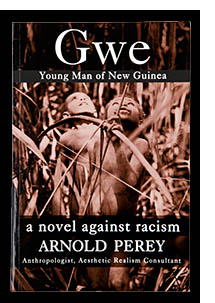 Imagine what would happen if every person in our country felt: “Life in my dear home town is inseparable from the everyday life of people in other places, and those people matter to me. Knowing them is a means of knowing my nearest neighbors and myself more truly.”
Imagine what would happen if every person in our country felt: “Life in my dear home town is inseparable from the everyday life of people in other places, and those people matter to me. Knowing them is a means of knowing my nearest neighbors and myself more truly.” This way of seeing was celebrated in an exciting theatrical event that took place in New York City on June 10: a dramatic reading, with music and slides, of Gwe: A Novel against Racism, by anthropologist Arnold Perey. The flyer stated: “You’ll take a trip to the heart of Papua New Guinea, to the mountains, peaceful and turbulent, where Gwe lives. You’ll experience, as close to you as your fingertips, an ancient culture, real people, and real events. . . . “We invite you to a new understanding of the human self as you meet Gwe, his relations, his enemies, and Alan, the anthropologist who lived with them.”
This is what I wanted for my own life in 1973, when I went to the Dominican Republic to do anthropological
The Objection to Common Core Testing
In your Letters column of April 2, two Sayville parents have expressed their objection to the Common Core testing in our public schools. They describe its devastating effect on children and their teachers, writing with logic and a passion that I respect very much.
Near where I reside in Brooklyn, standardized testing is being used to close schools in poor neighborhoods. These “failing schools” are being replaced with charter schools that will make a profit for their investors while drawing on public funds, further weakening public education. While the situation in Sayville, where I grew up, is not yet that dire, it is being argued in both communities that the needs of children are being sacrificed to the selfishness of teachers. Actually, teacher demands for decent pay, proper classroom sizes, adequate supplies and job security are the kind of benefits every working person is looking for. In a manner that is completely shameful, New York State teacher evaluations are being tied to test scores.
There is a powerful teaching method based on Aesthetic Realism that shows children that every subject is related to their very selves. Teachers who use it are succeeding, even under the current testing mandate. For more information, go to www.aestheticrealism.org or call 212-777-4490.